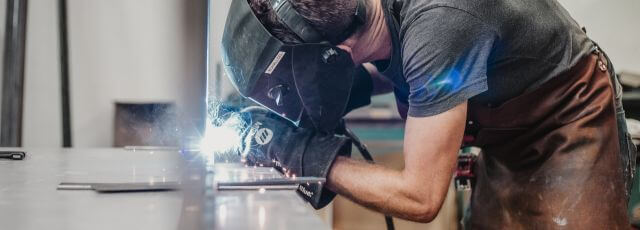Welder interview questions and answers
A Welder is a skilled tradesperson who joins metal parts using various welding techniques. Proficiency in welding requires technical knowledge, steady hands, attention to detail, and a strong understanding of safety procedures. Welders work in diverse industries, from construction to manufacturing, playing a critical role in building and repairing metal structures.
This Welder interview questions profile brings together a snapshot of what to look for in candidates with a balanced sample of suitable interview questions.

Make sure that you are interviewing the best Welder candidates. Sign up for Workable’s 15-day free trial to hire better, faster.
6 good welder interview questions
- [Highly suggested by real hiring managers] Do you have an American Welding Society (AWS) certificate?
- Can you describe the different welding techniques you are proficient in?
- How do you maintain safety standards during welding operations?
- Describe a complex welding project you have worked on. What were the challenges, and how did you overcome them?
- What experience do you have with welding automation technology?
- How do you ensure the quality and strength of your welds?
Here are 6 essential interview questions and sample answers to help identify the best candidates for this role.
1. Do you have an American Welding Society (AWS) certificate?
Checks for professional certification that validates the welder’s skills.
Sample answer:
“Yes, I am AWS certified. I completed my certification last year, which has enhanced my understanding and proficiency in various welding techniques.”
2. Can you describe the different welding techniques you are proficient in?
Assesses the range of the candidate’s welding skills.
Sample answer:
“I am proficient in TIG, MIG, and stick welding. Each technique has its unique applications, and I’ve used them in various projects from automotive repair to industrial fabrication.”
3. How do you maintain safety standards during welding operations?
Evaluates the candidate’s commitment to safety in the workplace.
Sample answer:
“Safety is paramount in welding. I always wear protective gear, ensure proper ventilation, and follow all safety protocols to prevent accidents and health hazards.”
4. Describe a complex welding project you have worked on. What were the challenges, and how did you overcome them?
Inquires about hands-on experience in challenging welding tasks.
Sample answer:
“I worked on a custom metal sculpture requiring intricate welding. The challenge was in the precision and aesthetic quality of the welds. Patience, steady hands, and frequent quality checks helped me successfully complete the project.”
5. What experience do you have with welding automation technology?
Probes into the candidate’s familiarity with modern welding technologies.
Sample answer:
“I’ve worked with semi-automated welding systems in my previous role, mainly for repetitive, high-volume tasks. It required me to oversee the process and make adjustments for optimal weld quality.”
6. How do you ensure the quality and strength of your welds?
Tests knowledge of quality assurance in welding.
Sample answer:
“I ensure quality and strength by strictly adhering to welding procedures, properly preparing materials before welding, and conducting post-weld inspections and tests.”
What does a good welder candidate look like?
A competent Welder candidate should have a mix of formal training, such as an AWS certification, and practical experience in various welding techniques. They must demonstrate a strong commitment to safety standards and the ability to produce high-quality, strong welds.
Good candidates are also adaptable, capable of working with traditional and modern welding technologies, and possess problem-solving skills to tackle complex projects. They should have good physical stamina and precision, essential for performing intricate and demanding welding tasks.
Red flags
Red flags in a Welder candidate include a lack of certification or formal training, especially when required for the job. Limited understanding of different welding techniques or safety protocols is concerning, as it can lead to subpar work and safety risks.
Inability to articulate past welding experiences or challenges encountered may indicate a lack of depth in their practical skills. Candidates who are not up-to-date with current welding technologies or show little interest in continuous learning may struggle to adapt to evolving industry standards.
